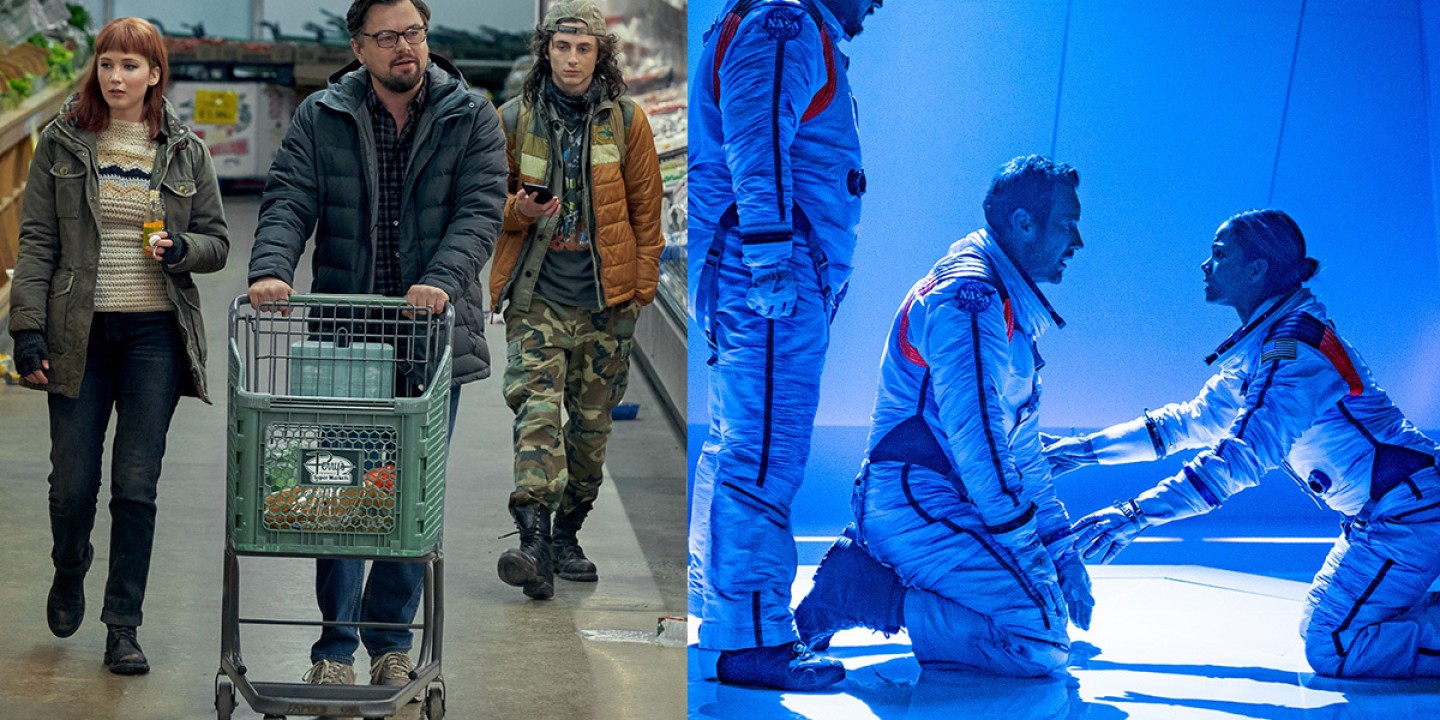The exuberant absurdity of Don’t Look Up and Moonfall
Watching the destruction of the world we were warned was coming is a staple of American entertainment.

I’m a sucker for movies that center scientists as heroes, so I was primed to like Don’t Look Up (directed by Adam McKay, streaming on Netflix) even before it garnered four Oscar nominations and a lot of buzz as a climate change parable-parody. Prickly astronomy graduate student Kate Dibiasky (Jennifer Lawrence) and her likable mentor Randall Mindy (Leonardo DiCaprio) discover a comet on a direct collision course with Earth. Scientific consensus quickly emerges: extinction is guaranteed. Faced with this incontrovertible truth, the powers that be—represented by US president Janie Orlean (Meryl Streep channeling a populist-authoritarian energy), the mainstream media, and overconfident tech billionaire Peter Isherwell (Mark Rylance)—oscillate between downplaying the threat, denying it, and trying to figure out how to profit from it.
Ordinary people, who we hear a lot about but never really hear from, are left with no lodestars to guide them. At best, those who want to understand the truth are told to sit tight and trust the experts to execute a harebrained scheme that no one in the mainstream scientific community endorses. At worst, they are whipped into a frenzy of comet-denying populism chanting the movie’s title as a slogan. It is not until the comet actually appears in the sky, visible to the human eye, that everyone does in fact look up.
Read our latest issue or browse back issues.
The parallel with our own reality is stark: we know the time to act to avert the worst outcomes of climate disaster is running dangerously short, but we lack the collective will to face this truth. We are being misled by powerful people for their own short-term profits, and we are too distracted by our social media entertainment bubbles to demand change. The movie is at its best—and its funniest—when it parodies just how quickly media, tech, and political maneuvering converge to distort the truth for profit and power. Even Dr. Mindy is sucked into the media-profit machine, shilling for an idea he knows is utterly bogus. In the end, though, the voices of scientific truth gather for the only real human ritual in the movie—a shared meal at the end of the world that becomes a kind of requiem for truth spoken and ignored.
That trope of the scientist hero that I love so much complicates Don’t Look Up’s intervention in our cultural discourse. The misunderstood scientist who battles incompetence, political inertia, and a disbelieving public, after all, is a staple of mainstream disaster movies—and watching the destruction of the world we were warned was coming is a staple of American entertainment.
Filmmaker Roland Emmerich has built a movie empire out of these tropes, and his latest release, Moonfall, hits all these beats in a story about the moon out of orbit and hurtling toward Earth. Unlike Don’t Look Up, Moonfall is not a parody, but sometimes it sounds like one. NASA scientists stare at enormous computer screens and say things like “Everything we thought we knew just went out the window. We are not prepared for this.” But, as always, a few of them did know, if anyone had cared to listen. A discredited astronaut saw something suspicious on his last mission, but no one took him seriously. A rogue scientist realizes what is happening before anyone else. They team up to speak truth to power and undertake the most improbable space mission ever imagined to save the world.
You could drive a tractor trailer through the gaps of logic in this plot, but the movie is more interested in showing us a tractor trailer getting sucked off the road by the out-of-orbit gravitational pull and hurled like a matchstick into the side of a mountain. If you accept that movies like this exist primarily for the aesthetic pleasures of CGI-enhanced disaster montages, there is an exuberant absurdity to Emmerich’s canon: no one does the utter destruction of civilization’s infrastructure with quite the same verve.
His movies also follow a well-worn script of merging scientific investigation with fringy, conspiracy thinking. In 2012 (2009), respected scientists are forced to reckon with the truth of an ancient Mayan prophecy predicting the end of the world. The Day after Tomorrow (2004) depends on fictional paleoclimatology to make sense of a new instant ice age that is freezing the Northern Hemisphere in a matter of days. And the rogue scientist who understands what is happening before anyone else in Moonfall turns out to be a “metastructuralist”—someone who believes that a race of superbeings has populated space with metastructures, of which our moon is one.
This is the sort of thing that Don’t Look Up tries to parody, but it is also part of what dilutes its power to contribute to the change it wants to see. It indulges in the conspiracy thinking that imagines the world as a three-way battle between individuals trying to speak the truth, a powerful set of elites who do not want the truth to be known, and a sheeplike public who are unwilling to think for themselves. We can know rationally and philosophically that conspiracy and scientific claims to truth are not the same. But as narrative devices and character arcs inside Don’t Look Up they feel the same. They both make the heroic act one of knowledge—of seeing things as they really are and heroically fighting for that knowledge against insurmountable odds. And if I am honest, I found the metastructuralist (played by John Bradley) in Moonfall at least as believable and even more endearing than the midwestern scientists in Don’t Look Up.
This entire paradigm assumes that the greatest challenge to making change is changing people’s minds. For all its parody, Don’t Look Up earnestly believes this; it’s maybe even a little vindictive about it. The doubters will eventually have no choice but to believe, but in the meantime they will doom all the rest of us with them. Knowledge can’t save even those who have the courage to face the truth. This might explain why Don’t Look Up ultimately feels like just one more disaster movie: it is far easier—and maybe even more fun—to imagine the apocalyptic end of the world than to imagine how we could live in a radically different way now to prevent it. But we might have to look away from disaster if we are going to imagine the new genres, plots, and narrative devices that can do that work.
A version of this article appears in the print edition under the title “Disaster fatigue.”






